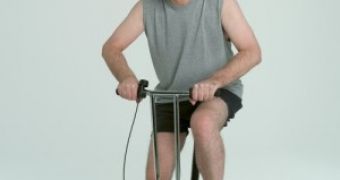Muscle deterioration is one of the main discomforts that older people experience with age, as falls and fatigue occur often. This limits their movement and, sometimes, doesn't allow them to take care of themselves. So elderly suffering from muscle problems experience health issues and mental discomfort at the same time. Now, researchers say that these problems could go away, if these people started using beta-alanin (BA), a substance that could restore at least a part of their muscular vitality.
Scientists at the University of Oklahoma, in the United States, conducted a double-blind study on 26 elderly men and women, in an attempt to analyze the effects that the use of this dietary sports supplement had on their muscles. A part of the group was given BA, while the other participants received placebo pills. The results showed that about 67 percent of those who got the real substance experienced a clear improvement in their fitness levels.
Out of those who took the placebo pill, only roughly 22 percent showed signs of improvement. All the participants to the study had their fitness levels measured before and after a 90-day survey, during which time they received daily dosages of BA.
"Our data suggest that 90 days of BA supplementation increases physical working capacity in elderly men and women. These findings are clinically significant, as a decrease in functional capacity to perform daily living tasks has been associated with an increase in mortality, primarily due to increased risk of falls," the study authors say.
BA helps intracellular pH in the muscles remain within normal parameters when they work. This means that fatigue sets in later and the elderly can conduct activities that they would have otherwise been unable to. "This [study] could have importance in the prevention of falls, and the maintenance of health and independent living in elderly men and women," concluded Jeffrey Stout, PhD, the leader of the research team at the University of Oklahoma.

 14 DAY TRIAL //
14 DAY TRIAL //